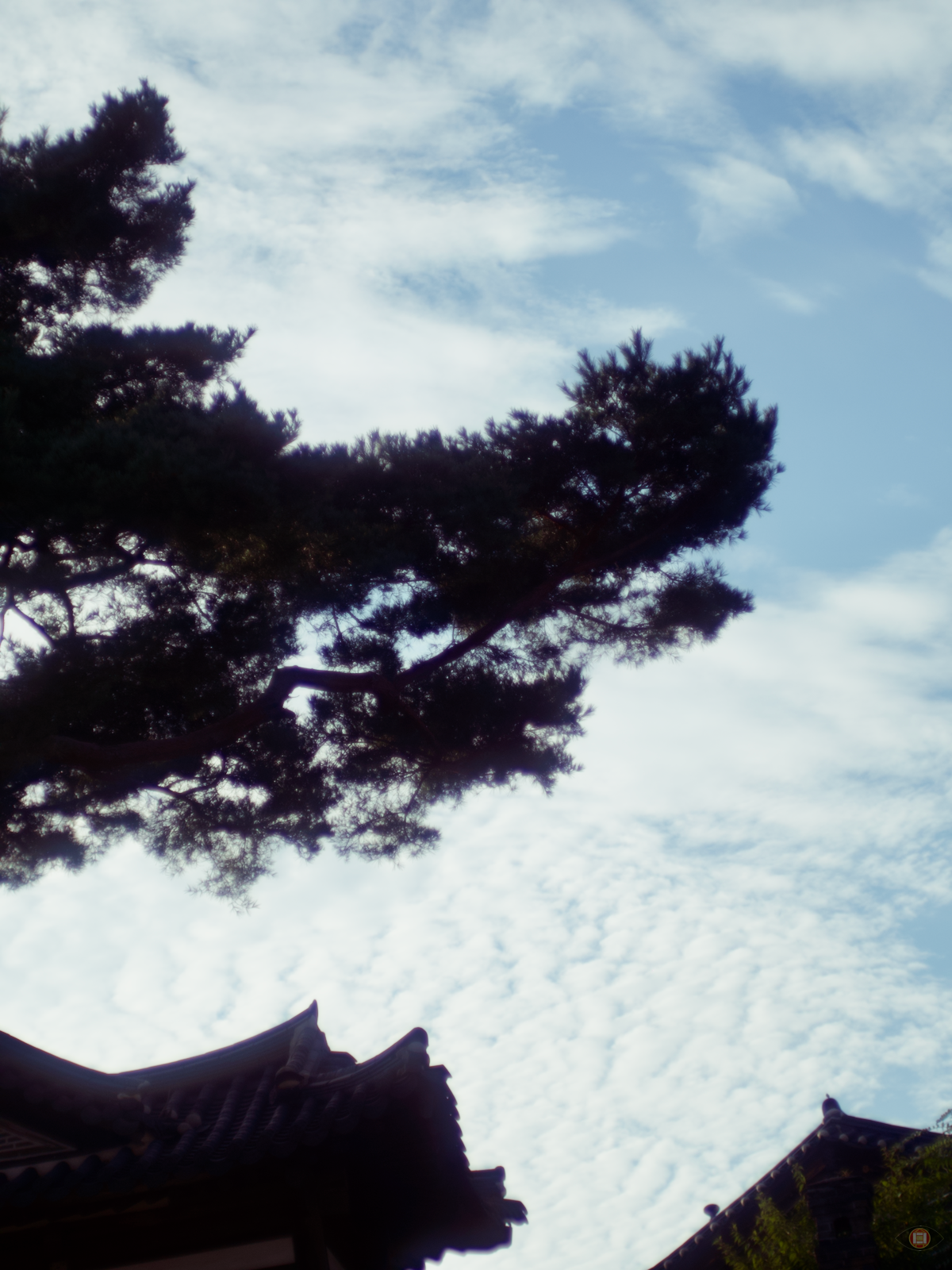Korea,
Pt.1
한국
September 2024
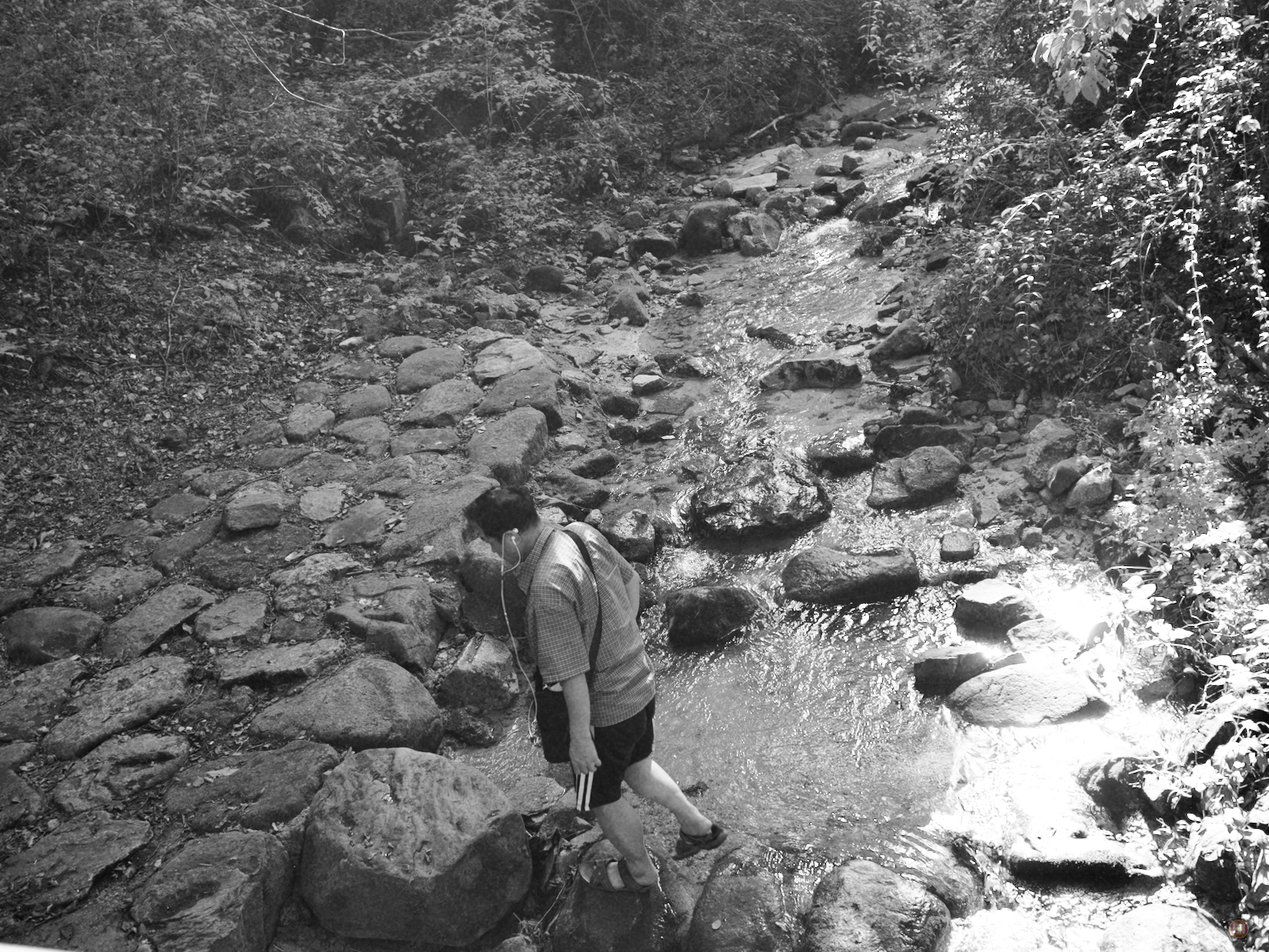
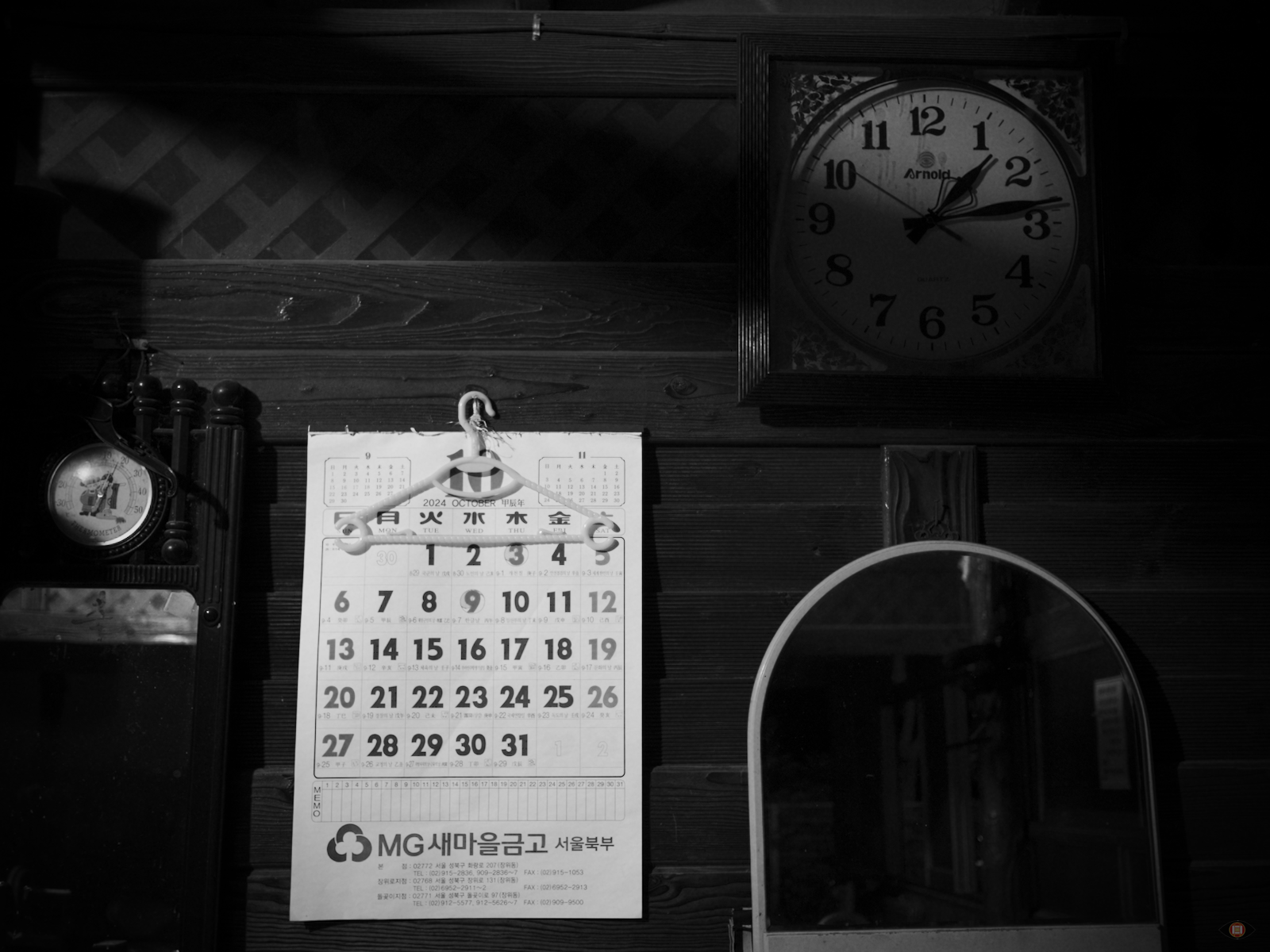
‘Excuse me Sir, do you know where I can get cash out?’
He thinks I am asking him for money and mimes that he has none on him. Machine translating, pouring sweat in 95% late afternoon humidity.
‘No I have money, I am looking for an ATM. Do you know where I can find one?’
He nods:
‘Yes. I will show you. Where are you from?’
‘Australia. You speak English?’
‘Yes, little bit. I travelled to California.’
‘Oh nice. I used to live in Los Angeles. Do you like California?’
‘I like it very much.’
He leads me to a suite of indoor ATMs and waits outside while I walk into the mercifully air-conditioned booth, replete with classical music playing from the ATM itself. An étude and a fistful of ₩ later we are back on the steaming asphalt.
‘I want to buy you a drink?’, he says.
‘I don’t drink alcohol. But…’
‘Coffee?’
‘Sure!’
We sit on a bench in a sterile business district drinking canned americano surrounded by suits rattling their wheeled briefcases off into peak hour.
We sit on a bench in a sterile business district drinking canned americano surrounded by suits rattling their wheeled briefcases off into peak hour.
‘What kind of work do you do?’, I ask.
‘Government job. Museum. Cultural Park. Close by.
‘Do you like your job?’
He smiles wryly, shrugging. We laugh.
‘How long will you stay in Seoul?’
‘One month. Then I might head to the south.’
‘Where do you stay in Seoul?’
I’ve forgotten the name and point it out on the map.
‘Very far. Why you stay there?’
‘To live like a local.’
‘Seoul very busy. Too much people.’
‘Yes.’
‘Do you want to go to the bar?’
I want to get to my let, unload and shower.
‘I want to get home.’
The man looks crestfallen; his eyes plead for company; incredibly sad and lonely.
‘No problem.’
‘But I will come find you at the Cultural Park. You are a very nice man. You rescued me. I was thinking ‘How will I get to my home?’, but then you appeared. Like an angel.’
He smiles, bowing.
‘You are nice man too.’
We shake hands and part ways. I never make it to the Cultural Park. One of the things I had every intention to do, before time slipped away.
Two hours and my own endless detours later––a journey that should have taken forty minutes––brings me to the Seongbuk neighbourhood. I have conquered the Seoul Metro System. I'm starving and sticky with the baked-on sweat of multiple Asian-Pacific time zones. But I am ecstatic to be here; the sun is setting and gold light of a gypsy Summer smelts the strange, unchartered streets and alleyways; neon billboards covered in beautiful, alien language flicker on and project propaganda to heaven.
…my host writes me Friday morning. I need to see green, nature, vitality, happiness. I clamber along a wooden walkway suspended above a steep, forested incline, watched at every turn by CCTV cameras and fluoro yellow signs that slice the natural world in twain.
Two hours and my own endless detours later––a journey that should have taken forty minutes––brings me to the Seongbuk neighbourhood. I have conquered the Seoul Metro System. I'm starving and sticky with the baked-on sweat of multiple Asian-Pacific time zones. But I am ecstatic to be here; the sun is setting and gold light of a gypsy Summer smelts the strange, unchartered streets and alleyways; neon billboards covered in beautiful, alien language flicker on and project propaganda to heaven.
︎
Good forest library behind the apartment. There are cafes. Hiking trails. You need to go up. Be sure to go when you need healing :)
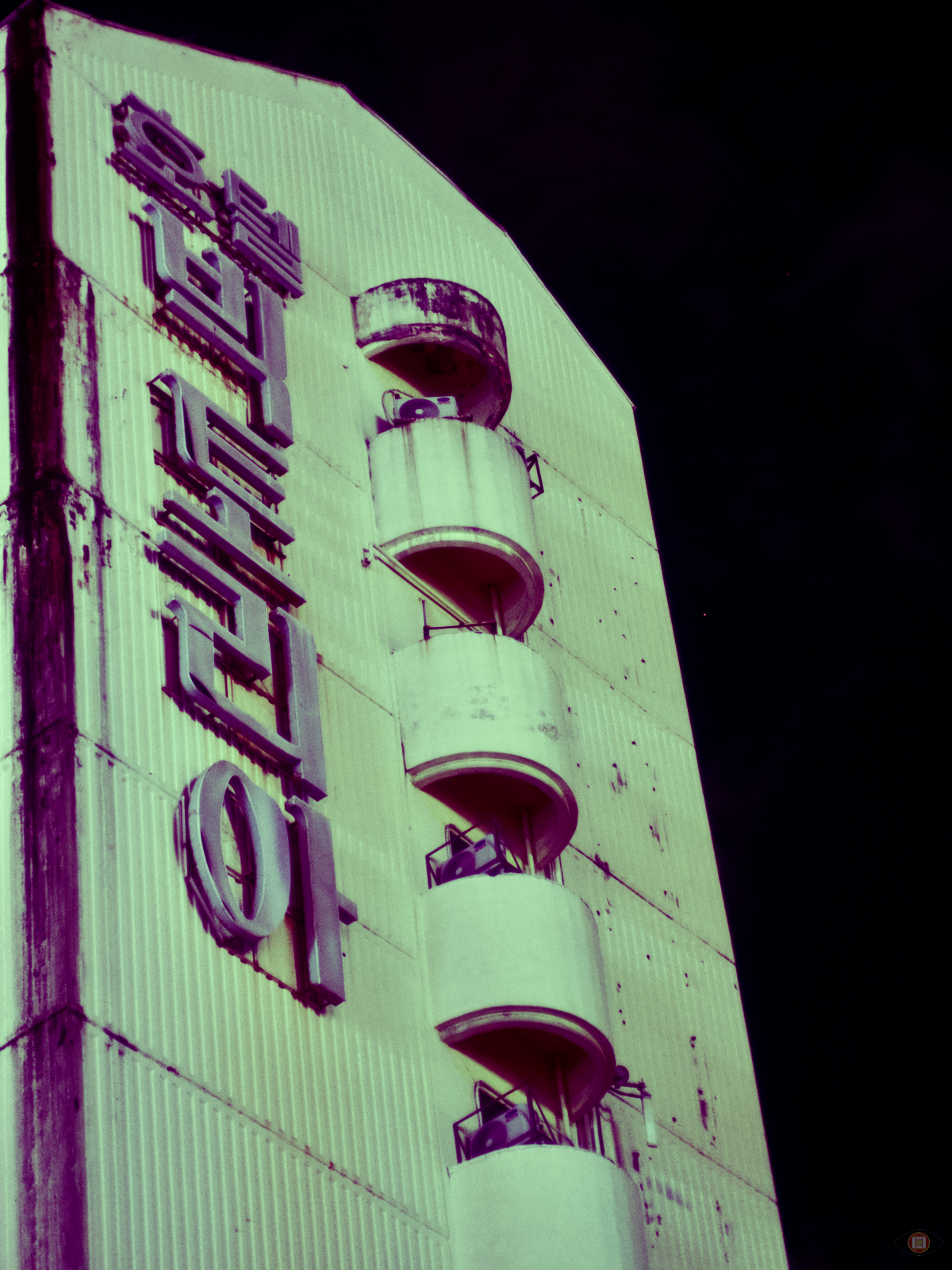
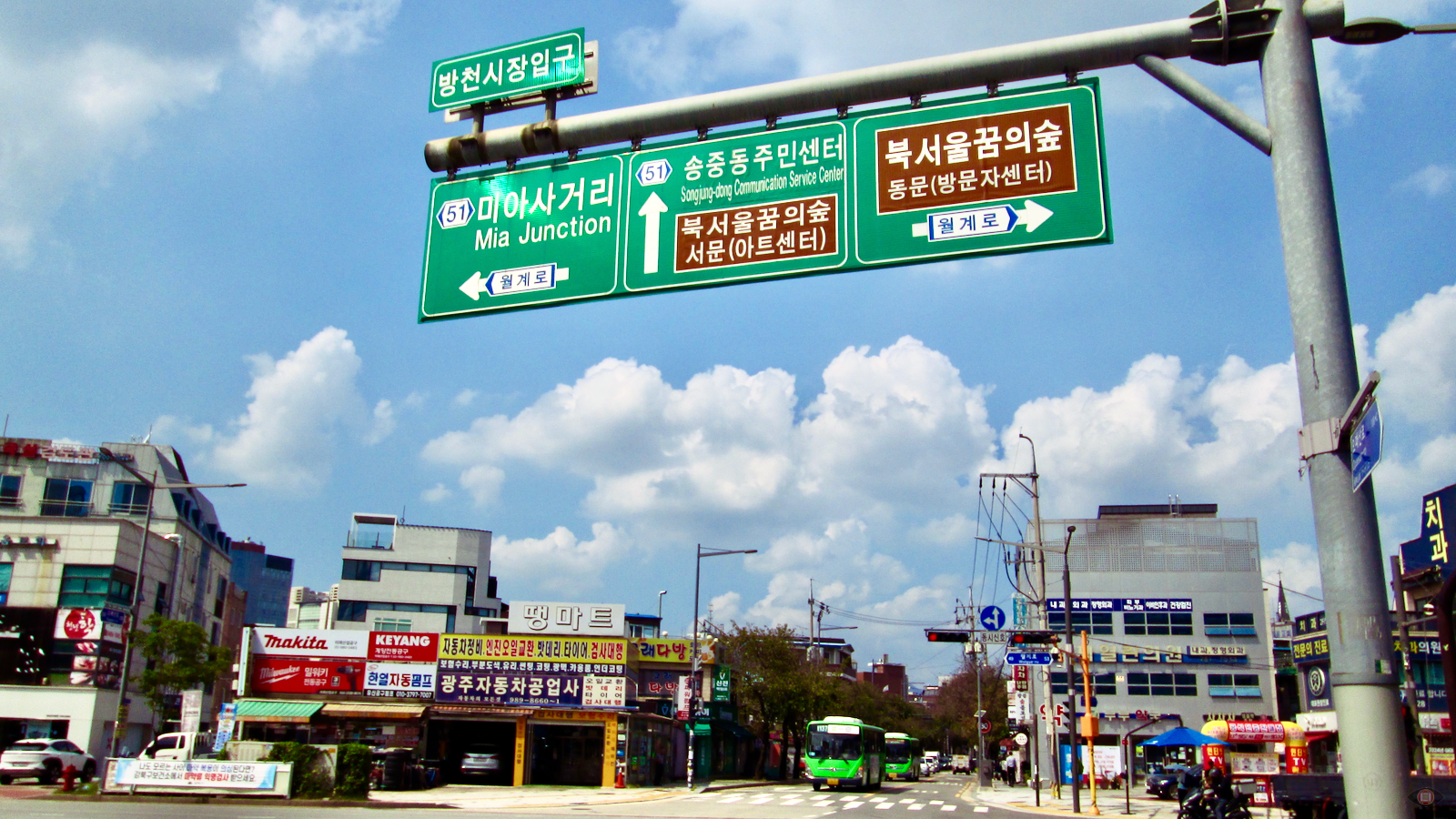
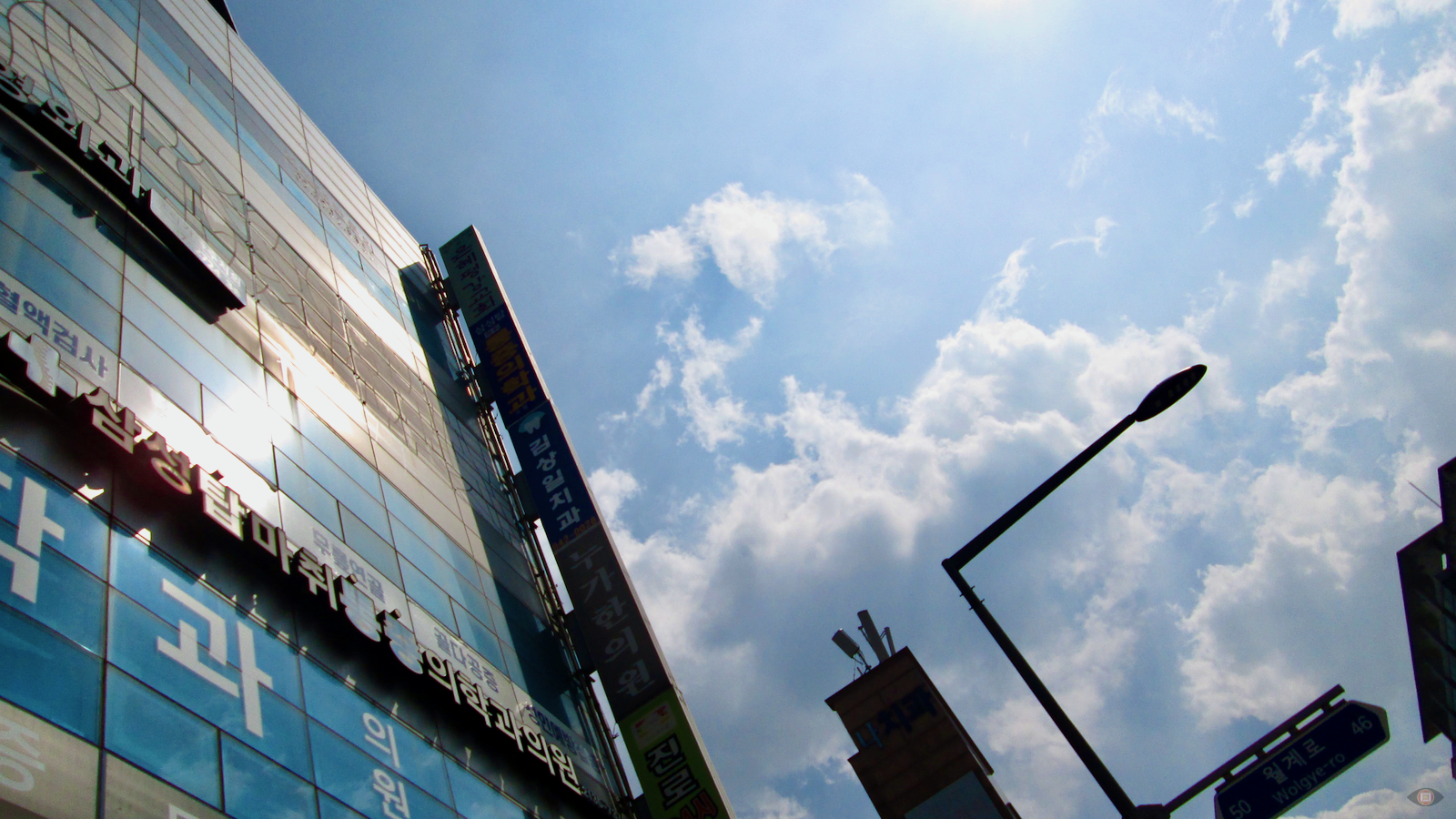
An old homeless woman sits under a raised pagoda at the top of the mountain in Odong Park, far above the city. She moves from little spot to little spot slouching her worldly possessions over her shoulder, bantering with old people passing by, chuckling contentedly.
I’ve come to do a work out; there are monkey bars, somewhere, the map says. Sweat pours; I am later told it is the hottest September on record. At the precipice of the mountain, overlooking this concrete and steel mega-metropolis though, I am totally flawed and forget why I even climbed up here.
Finally alone again, far away on this magic carpet, all chatter of loved ones a memory; in my mind, the Georgian monasteries above Kutaisi, and beyond them still, Los Angeles' palms sway in long, halcyon afternoons. I snap back here.
The homeless woman catches my eye as I look around for the workout equipment. She speaks to me in Korean. But we smile at one another and laugh and she follows my step to the point where I am not sure if she's following me, or I her. There it is; the Alcatraz-come-River-Kwai-open-air prison-gym of my faded pornstar dreams; replete with rusted and duck-taped gear once at its prime when Arnold was prepubescent in a little Austrian village.
‘Is it free?’
She looks at me and laughs. The app. No reception.
‘Do I need membership?’
More laughter.
I’m spent from the heat. As usual undersupplied with no water bottle. I’ll try my luck when it's cooler tonight.
감사합니다!
(thank you!)
We bow.
Saturday morning: the sun is shining and F16s are roaring above the metropole. I am not sure if I should be concerned especially given recent escalation in the form of shitty nappy hot air balloons floated by the North and K-pop blasted over the border back towards Pyongyang. But I have received no public safety announcement yet––which come in hard and fast all day long––and peering out the window at the stream of umbrellas flip-flopping along the sidewalks, I assume the coast is clear. I am pumped for the metro. Now that I know how it works, I can literally go anywhere in Seoul or any of its adjoining cities. National Museum of Korea it is!
Transferring underground in the metro, a man in his 20s walks towards me, evidently under the K-pop spell. He makes straight for me, death-staring me and giving me two options––get immediately out of his way, or elicit a shoulder barge. WHAM! And he is shouting. I walk on like nothing happened.
The Great Hall at the National Museum of Korea is utterly breathtaking, especially today. A space-age, cavernous expanse presently filled with thousands of spectators on and around steps leading up from a stage assembled at its epicentre.
She looks at me and laughs. The app. No reception.
‘Do I need membership?’
More laughter.
I’m spent from the heat. As usual undersupplied with no water bottle. I’ll try my luck when it's cooler tonight.
감사합니다!
(thank you!)
We bow.
︎
Saturday morning: the sun is shining and F16s are roaring above the metropole. I am not sure if I should be concerned especially given recent escalation in the form of shitty nappy hot air balloons floated by the North and K-pop blasted over the border back towards Pyongyang. But I have received no public safety announcement yet––which come in hard and fast all day long––and peering out the window at the stream of umbrellas flip-flopping along the sidewalks, I assume the coast is clear. I am pumped for the metro. Now that I know how it works, I can literally go anywhere in Seoul or any of its adjoining cities. National Museum of Korea it is!
Transferring underground in the metro, a man in his 20s walks towards me, evidently under the K-pop spell. He makes straight for me, death-staring me and giving me two options––get immediately out of his way, or elicit a shoulder barge. WHAM! And he is shouting. I walk on like nothing happened.
The Great Hall at the National Museum of Korea is utterly breathtaking, especially today. A space-age, cavernous expanse presently filled with thousands of spectators on and around steps leading up from a stage assembled at its epicentre.
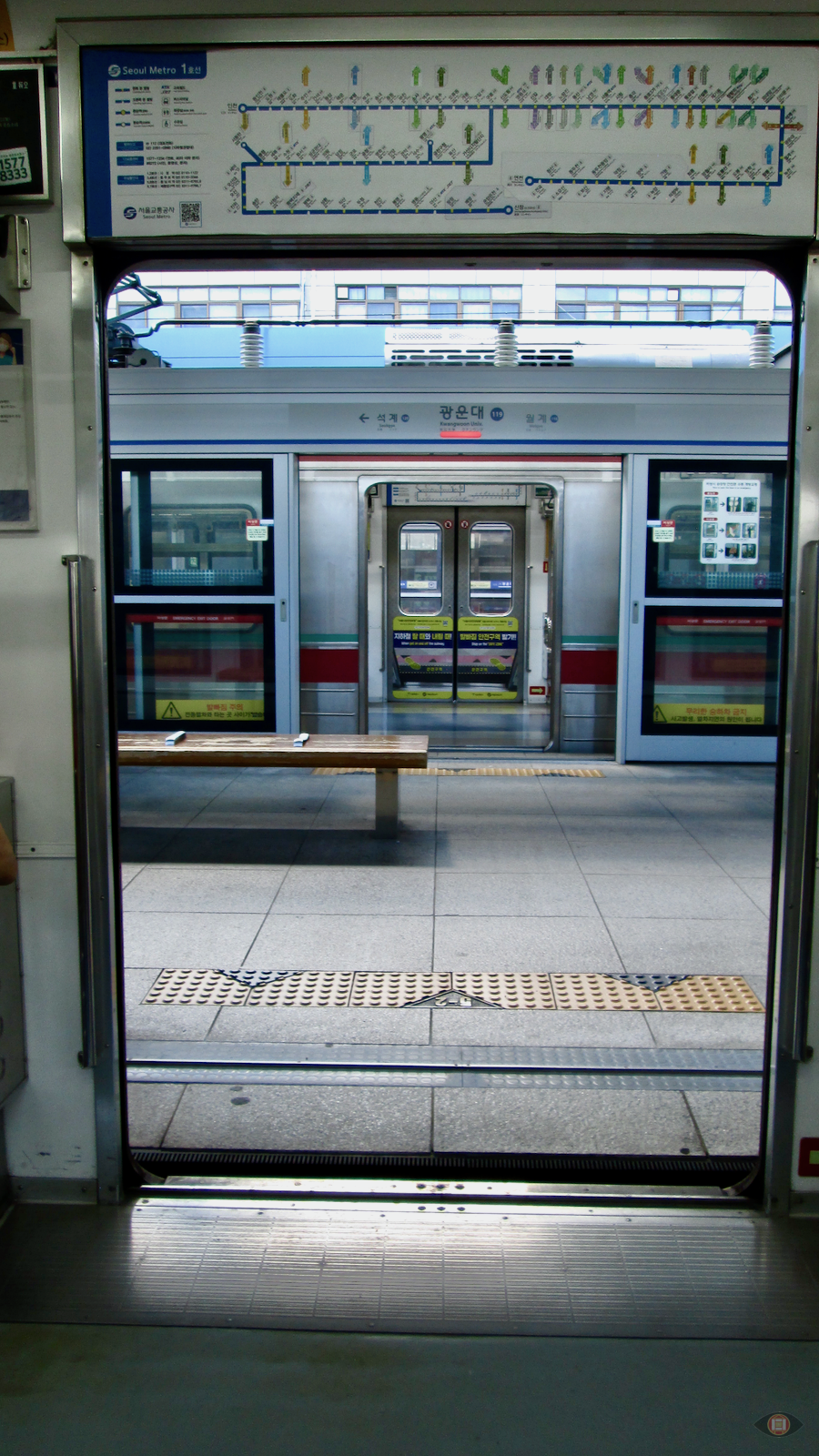
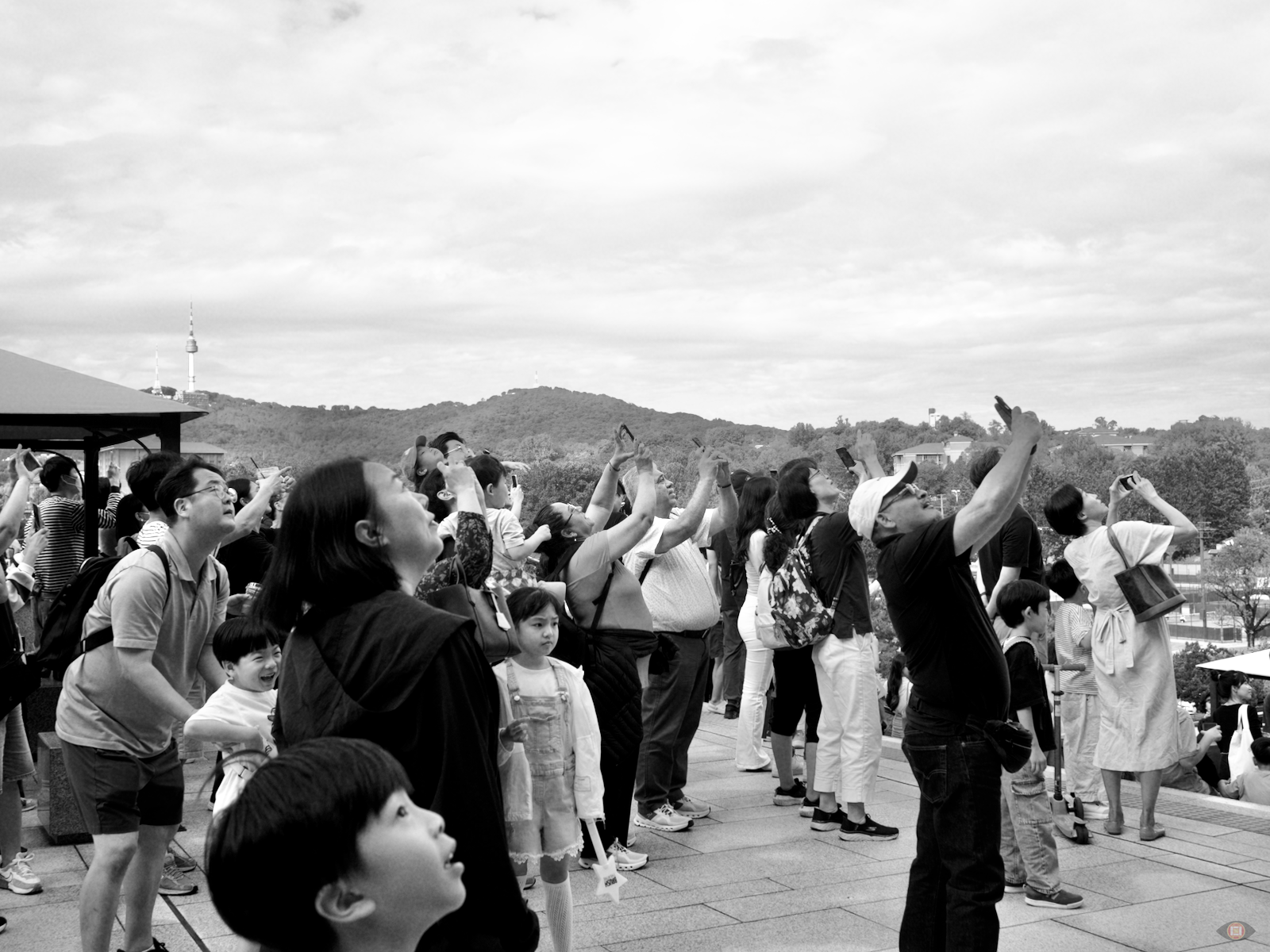
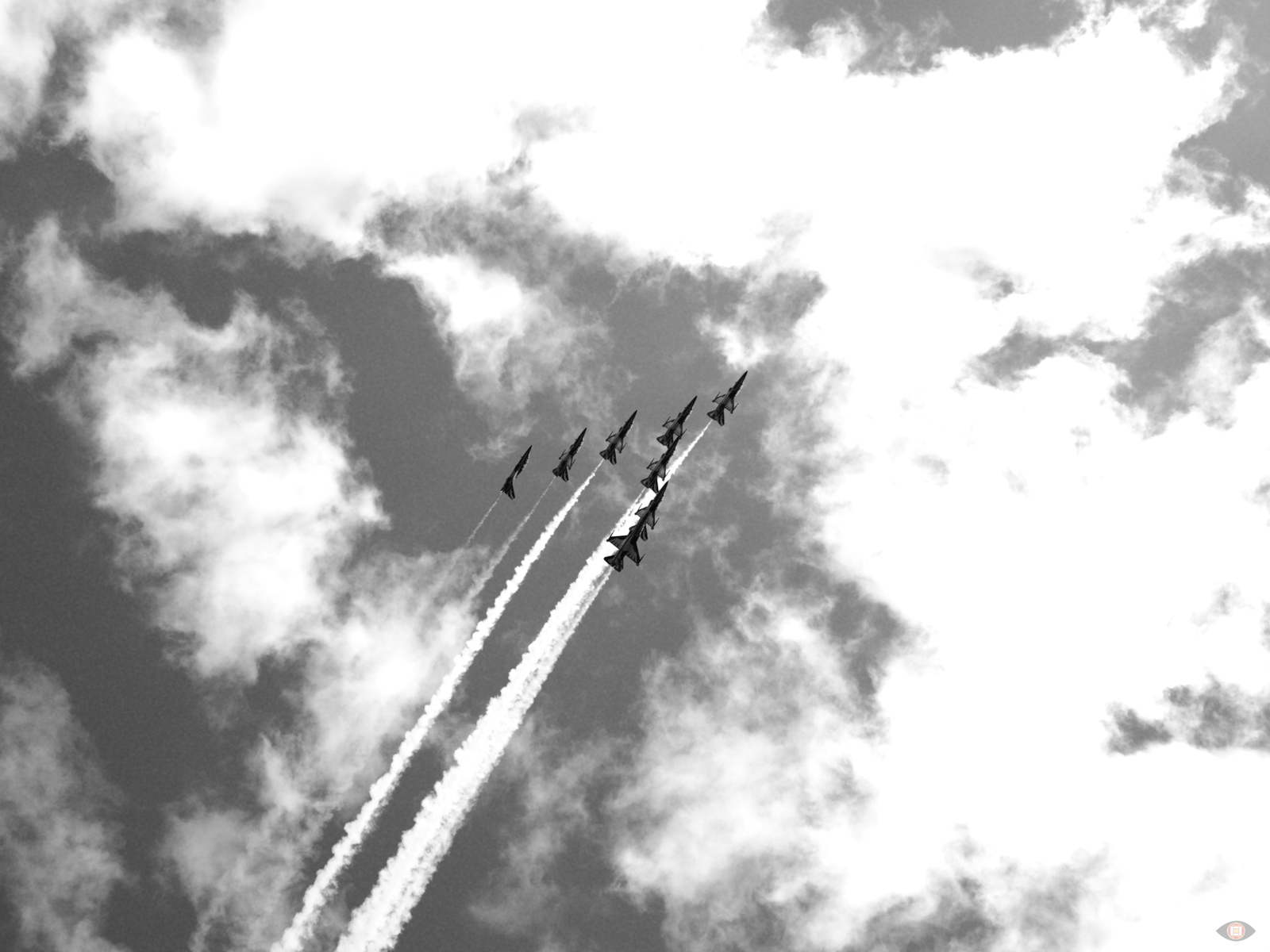
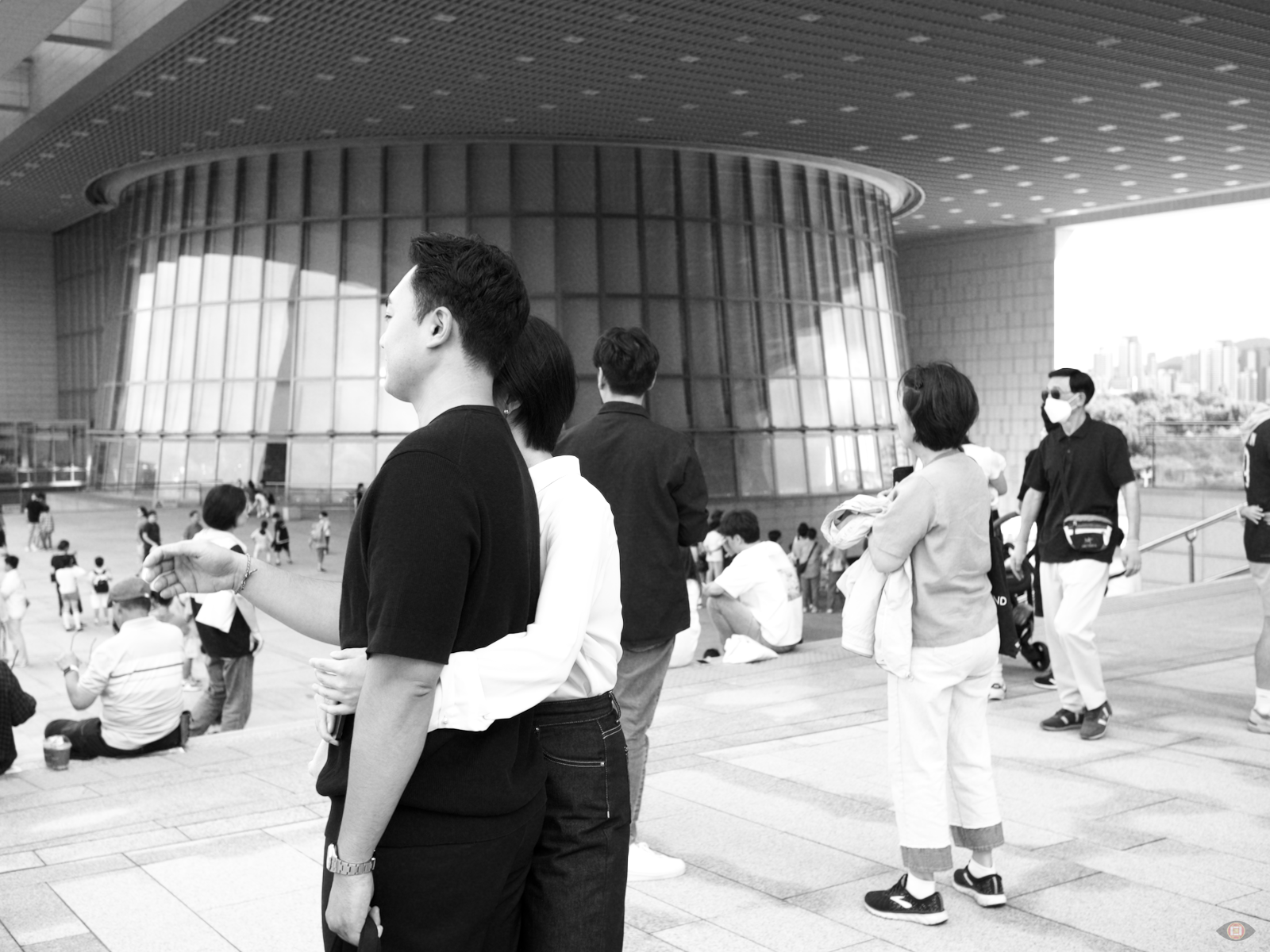
It is a strange spectacle; ominous in the face of an armistice and no peace on the Korean Peninsula; the roar of F16s collides with the hammering of percussion instruments on the stage––janggu––together proclaiming what seems like as a battle cry.
I make for the top of the viewing platform; North Seoul Tower crowns the opposite mountain; families are assembled, kids on shoulders, a wall of smartphones capturing the flyovers spraying out white, red, blue and black powder. In perfect formation, each swoop in this sortie is met with the jubilant laughter of children and parents pointing out the finer details. Lovers caress, nuzzling into one another, the elderly look on proud. Performers dazzle the crowd with traditional shamanic dance, leaping through the air playing instruments and pantomiming in flashes of gold, green and purple satin.
Inside a quiet wing of the enormous, impeccable building, a dimly-lit room protects fragile art––some of the most beautiful i’ve ever seen. Created in the 1700s during the Joseon Dynasty, vivid colours on finely woven hemp depict scenes of the life of Buddha; the Bodhisattvas come gathered around him riding high on clouds above the wretch of humanity; another scene of hell––not unlike ‘The Garden of Earthly Delights’ by Jheronimus Bosch––full of the same psychedelic hunger, sickness, avarice, theft, torture and murder.
Another blissfully empty room; an ode to the artwork of Japanese Zen. Gorgeous, perfect strokes of calligraphy, bucolic scenes of bunnies, ducks and saints-in-waiting; pagoda towers lead up to enlightenment; the hermit sage in contemplation, served by a disciple; the holy mountain towering above pagodas of religious/state power. Though this work is meant to show the superior, almost unattainable bridge between those on and off the path, I see a contradiction that is reconcilable only when viewed through our flawed nature; indeed, for there to be a superior way, would be to run counter to the principal ethos & philosophy underpinning it: that all is, apparently, one. If it is not one, then there are indeed monks, and kings, princes, and peasants. The hierarchies and ranks of a creature still in hell in the room opposite. But even my commentary, on anything––full stop––falls into this same trap: opposites, ranks, heroes, villains, on and on forever in samsara.
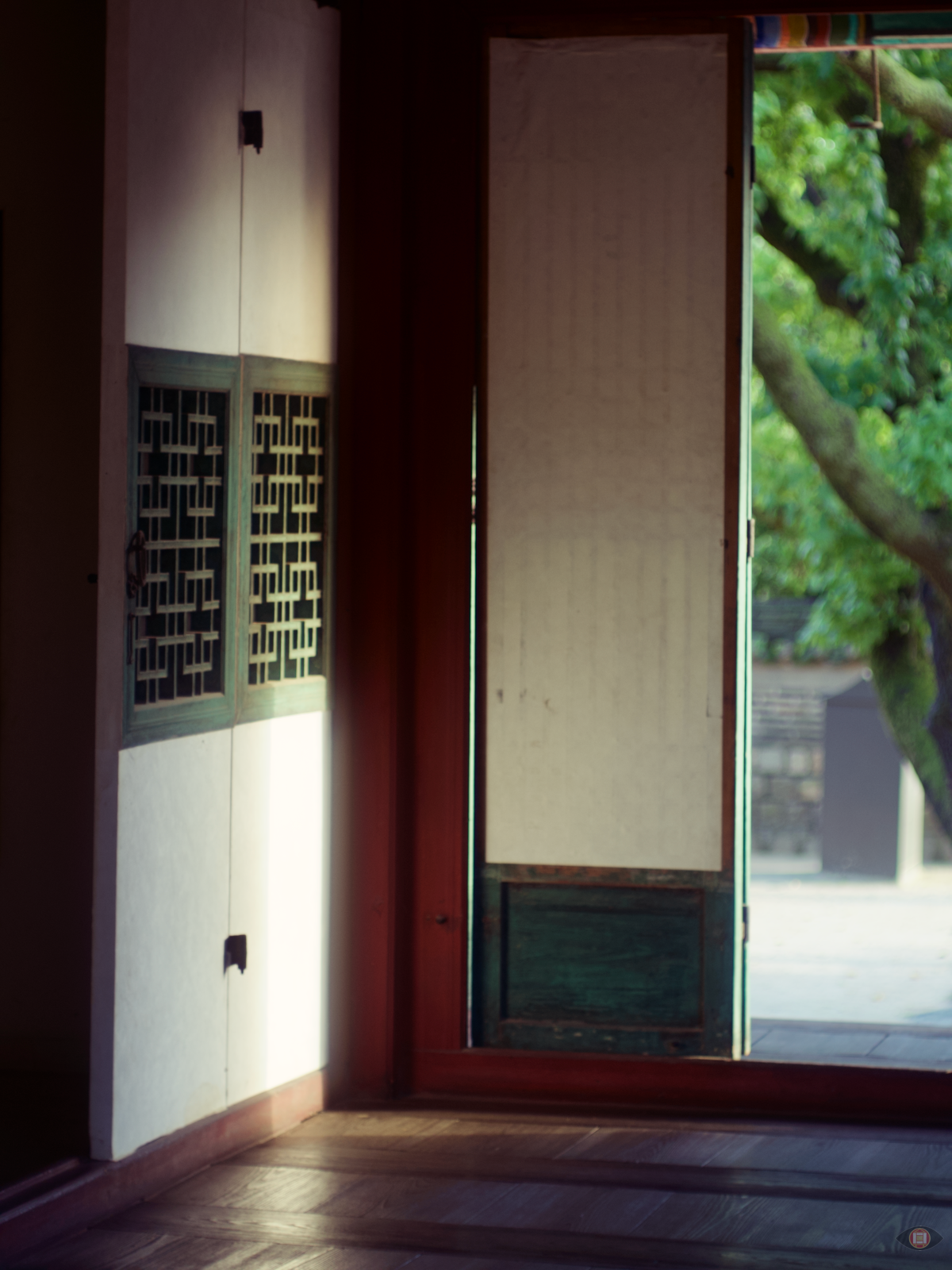
In my travels here and elsewhere in Asia, spiritual thought reflected in these societies––which I am always on the lookout for when travelling––and certainly in this modern age of extreme competition and obsession with appearances, is at its best in the enduring appreciation for the stillness of the pond, the perfect lines of the cultivated garden, the silence and incense in the temple. Despite its beauty and implied otherworldliness, culture taken too seriously falls into the traps of other more forceful kinds of nationalism at the heart of humanity's divisiveness.
Meanwhile, the Buddha blushes from hemp tableaux, then–as now–reduced mostly to a cheerleader for the politicking of men. But he doesn’t mind, and that’s the point, isn't it?
︎
